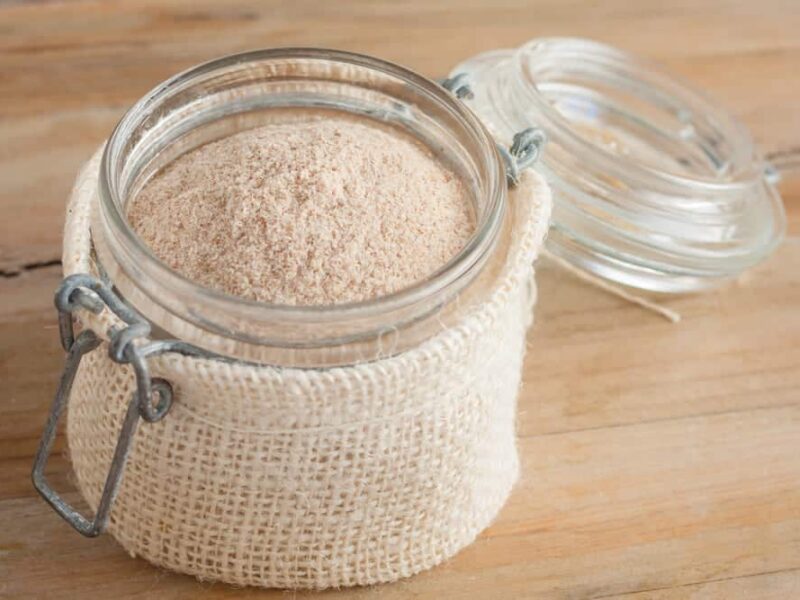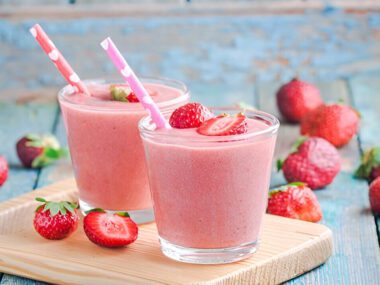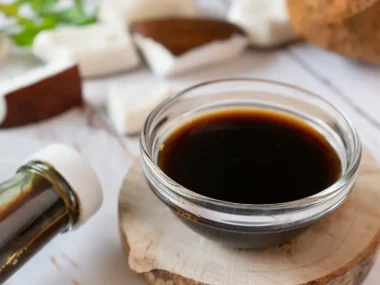Health-conscious people like us have used psyllium husk powder not only to maintain a healthy diet, but also because we want something gluten-free too, and you can add psyllium husks to smoothies or other psyllium husk recipes of your choice. However, this has proven difficult as it doesn’t seem that you have been able to easily purchase these products lately.
New recipes can be a real pain to try out! Luckily, there are plenty of other ingredients that are perfect alternatives for psyllium husk that have a comparable effect and can be purchased at your local grocery store!
The Best Substitutes For Psyllium Husk
1. Chia Seeds Flour

These are small gray-black seeds originally grown in Mexico and Guatemala by indigenous people. The seeds have a gelatinous outer layer that makes them sticky like the husk of the plant, but instead of being soluble in water like psyllium husks, chia seeds absorb up to 10 times their mass in water, making the seeds very soft.
Can psyllium husk be substituted for chia seeds? If you’re looking for an egg alternative or psyllium husk powder alternative, you’re better off with chia seeds, as they are regarded as much healthier compared to flaxseeds.
These seeds are readily absorbed proteins, and they also include omega-3 fatty acids, which are essential for lowering cholesterol and maintaining a healthy heart. They are also high-fiber foods that keep you fuller for longer and satisfied sooner, lowering your risk of overeating.
2. Rice Flour
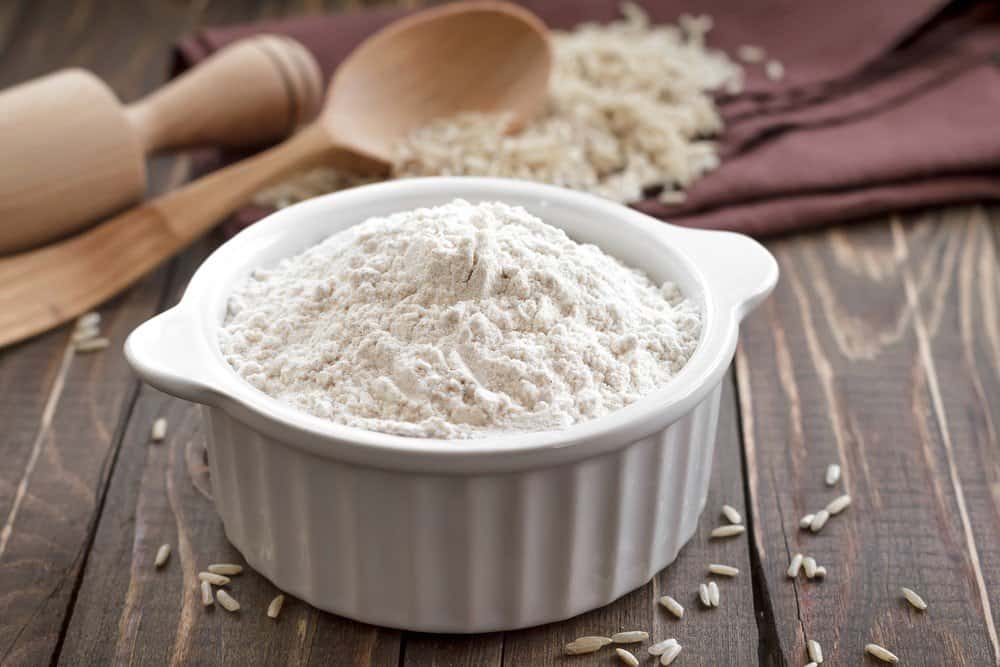
Rice flour is one option that has been proven to work well. It has a different texture from psyllium husk and may be a more desirable substitute for some people who are used to eating rice flour products. Rice flour will not provide your recipe with the same benefits as psyllium husk but it will still have some health benefits of its own due to its high fiber content.
If you want to make your favorite foods like pancakes and waffles, replacing psyllium husk powder with rice flour is a sure way to success. You’ll obtain the same outcomes as everyone else since it has a similar consistency to that of psyllium husk powder when mixed with water.
3. Flaxseeds Flour
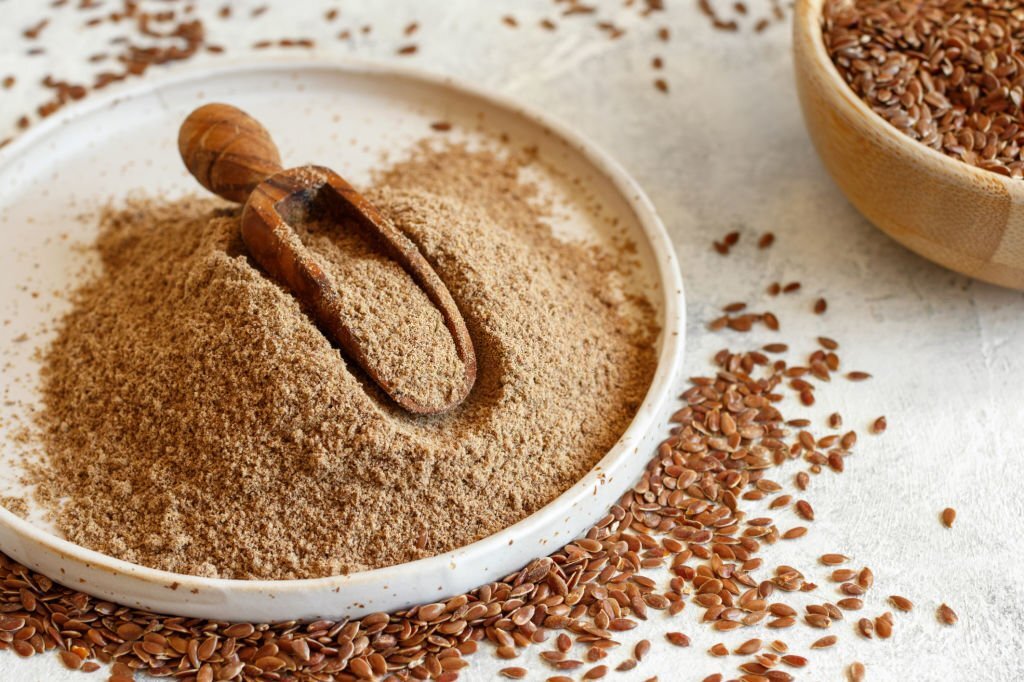
Flaxseeds are small brown seeds that have traditionally been used for culinary purposes, such as making bread and muffins. In addition to being a good psyllium husk substitute, they’re also a good alternative for eggs. The nutritional fiber in flaxseed meal makes it an excellent egg and dairy product alternative for vegans and vegetarians.
Flaxseed meals are very healthy as they are rich in Lignans and Omega-3 fatty acids. If you want a gluten-free psyllium husk powder substitute, this is the best option, as psyllium husks are obtained from a slightly allergenic plant but can still be used by those who are not gluten sensitive.
When it comes to nutritional value, flaxseeds are extremely high in fiber and include vital fatty acids that help you feel fuller for longer. Simply choose the whole seed and freshly grind it prior to use.
As a note, some varieties of flaxseed, such as brown, gold, or black seeds, can be used interchangeably in your favorite psyllium husk powder recipes. You should be aware that the nutritional value of different types of flaxseed may be different.
4. Xanthan Gum
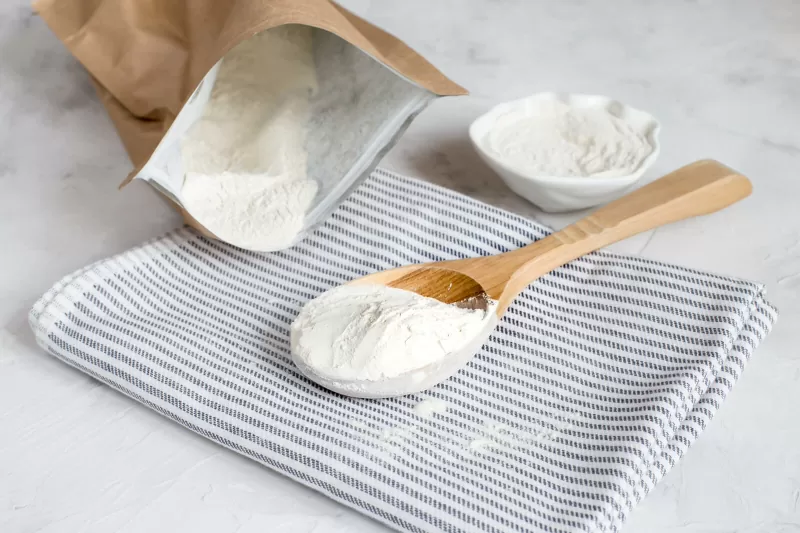
Xanthan gum is a product made from bacteria. It’s gotten pretty famous among bread makers, which is why you often see xanthan gum as an ingredient.
You can replace psyllium husk powder with xanthan gum because it gives your baked goods the elasticity they lack. But it also helps to retain moisture and keeps the bread fresh longer. Xanthan gum is an excellent psyllium husk alternative since it has a comparable texture, although psyllium husk powder is significantly more expensive. But remember that substituting xanthan gum for psyllium husk powder requires a lot more of it than psyllium because it absorbs water so well. So baking with xanthan gum needs a little more patience and time.
5. Cornstarch

When corn bread first came out, it was made with cornstarch. Cornstarch is frequently used in some corn products like corn tortillas. Because of its similarity in texture to psyllium husk powder, it is frequently used as a substitute for psyllium husk.
Most Americans associate cornstarch with comfort foods like corn dogs, pudding, and cereal. Using cornstarch is an excellent choice because it is easily accessible and inexpensive. However, as corn has been linked to numerous health problems, corn starch isn’t the healthiest option.
6. Almond Flour
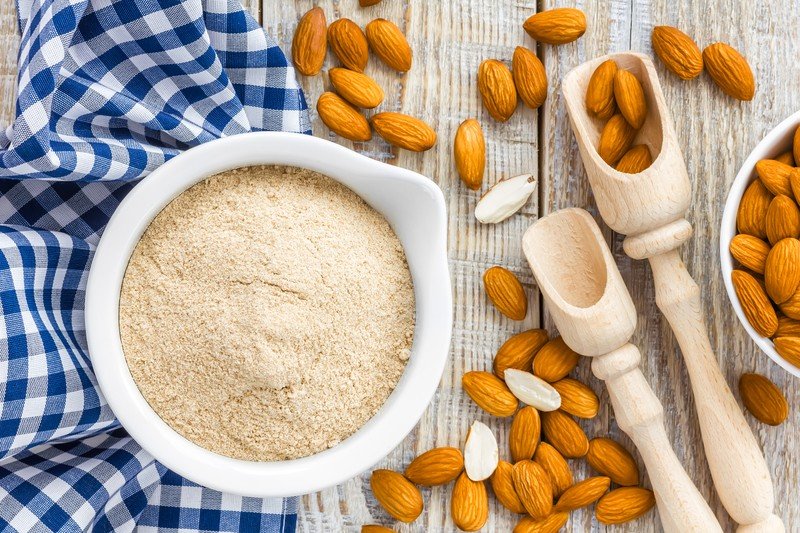
If you’re looking for a substitute for Psyllium Husk, one option is almond flour. It is a great substitute because it has a slightly similar texture to psyllium husk.
Almond flour can make you a great psyllium husk replacement for your favorite almond products like almond cake, cookies, or even almond milk, and can be used to make gluten-free pancakes and breads.
Almond flour is high in calcium and potassium, and is also rich in Vitamin E, which has been shown to promote heart health and reduce cholesterol levels. Additionally, Almond flour also is high in protein, which makes it an excellent substitute if you need more protein in your diet.
The downside of using almond flour as a psyllium husk substitute is that it doesn’t expand as much as psyllium husk does. However, this can be remedied by adding more liquid to your recipe or simply reducing the baking time.
7. Coconut Flour
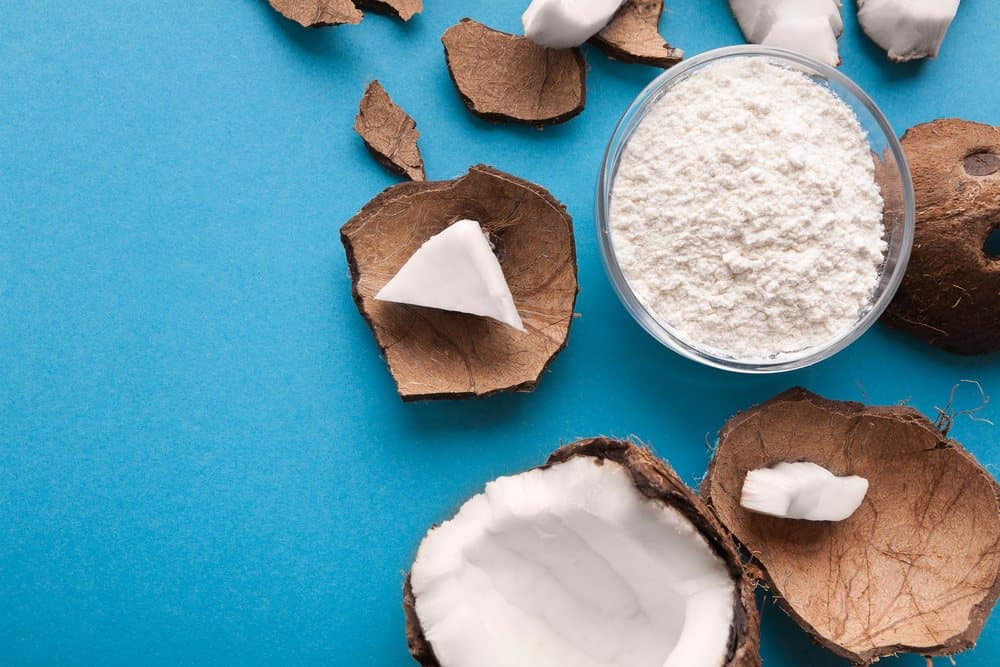
Coconut Flour is another popular choice amongst people who are searching for healthy gluten-free substitutes in recipes that use psyllium husk powder, like pancakes, bread, and even muffins. The benefit of coconut flour is that it is a low-carb component that can be used in a variety of recipes.
It has a good amount of fiber, as well as calcium and magnesium. The only downside to using coconut flour as a substitute for ground psyllium husk powder is that some people have difficulty digesting it and therefore need to include probiotic foods in their diets while eating foods made with coconut flour.
8. Arrowroot Powder
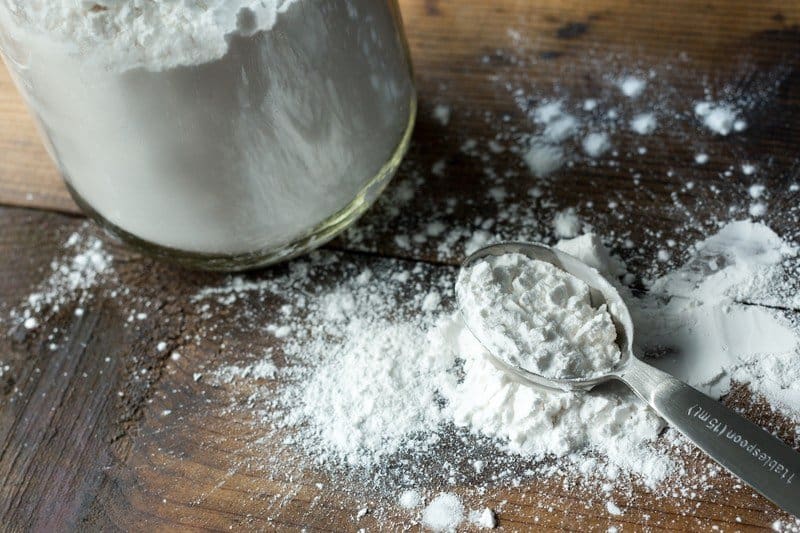
If you’re looking to opt for a cheaper psyllium husk powder substitute, consider using arrowroot powder for future recipes. Arrowroot is similar in texture to psyllium and also contains some protein and fiber. When making sauces and soups in the old days, arrowroot was commonly used as a thickening agent. It is commonly used today to thicken fluid meals such as smoothies, desserts, and jams. Arrowroot powder is most frequently used to make arrowroot cookies, but it can also be used to make pancakes, waffles, and muffins.
9. Tapioca Powder
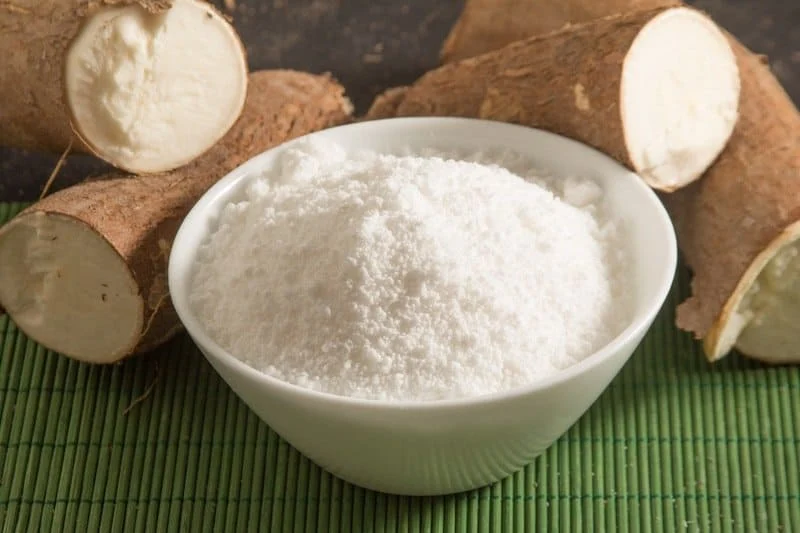
Tapioca powder is a fine psyllium husk substitute for gluten-free recipes. It’s been proven that tapioca can help restrain appetite because it contains a peptide that does so. So if you’re looking to lose weight and get a grip on it, substituting with tapioca powder will give you the results you want.
Tapioca pudding and tapioca muffins are just two of the many dishes you can prepare with it. There are many ways to incorporate this powder into your beloved baked items, including bread and sweet buns.
10. Potato Starch
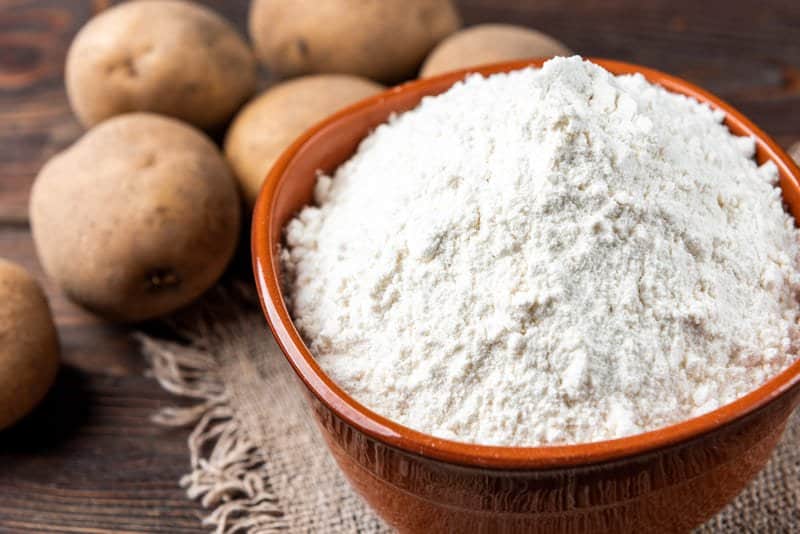
Potato starch is made from potatoes and therefore contains all the nutrients found in them, such as vitamin C, vitamin B6, and manganese. Because it does not include any animal ingredients, it is an excellent psyllium husk powder substitute for vegans. Soups and sauces benefit from the thickening power of potato starch. It’s a great replacement for psyllium powder for those who want to utilize it in baking. This item may also be used to make jams, jellies, and even pie fillings.
Because of its high fiber content, it is perfect for those who are trying to slim down. The only downside to using potato starch as a replacement for psyllium husks is that it has been linked to high blood sugar levels, especially when consuming large amounts of potatoes.
11. Guar Gum
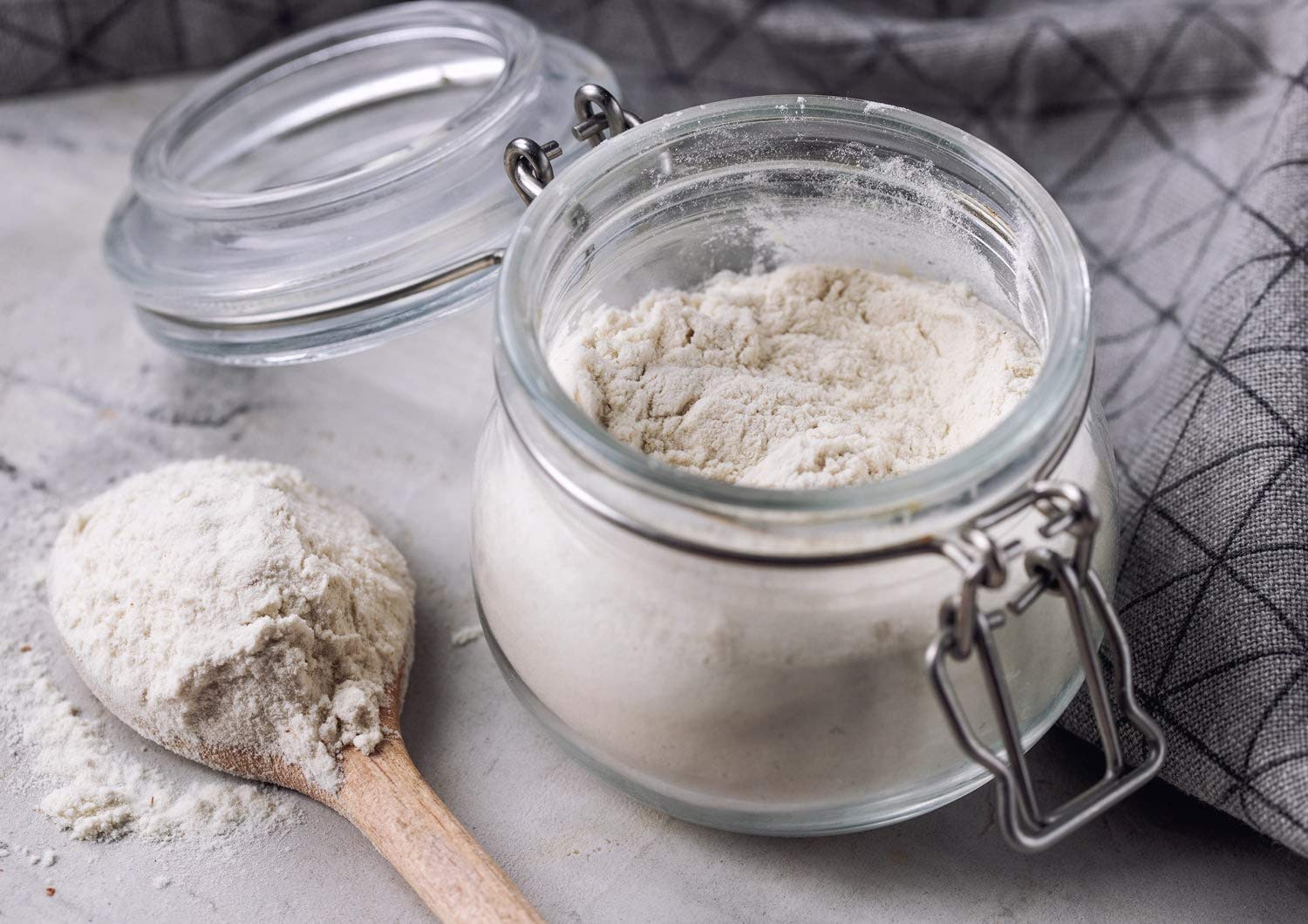
Guar gum is another psyllium husk powder substitute that you can use if you are on a gluten-free diet.
Guar gum is made of a high fiber powder extracted from guar beans. It is used as a thickener, emulsifier and binder in food products such as ice cream, sauces and gravies. One thing to keep in mind about guar gum is that it has a taste profile similar to psyllium husks. This may or may not be a good thing depending on the purpose of using psyllium husks in your product.
Guar gum has a few potential negative effects that you need to be informed about before using it in your cooking. The problem with this ingredient is that it has been shown to cause gastrointestinal problems like diarrhea and flatulence. So there are times when people can tolerate it better than others, but if you notice any negative side effects, switch to another psyllium husk substitute. Tapioca powder can be used in this scenario. It will give you the very same effects.
12. Glucomannan (Konjac Gum)
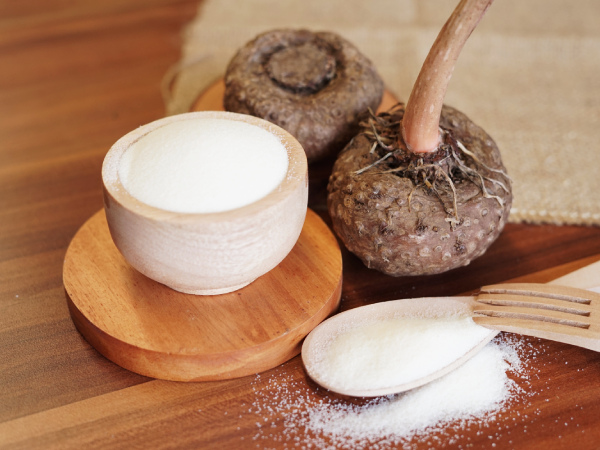
Glucomannan is an alternative to Psyllium Husk that can be used as a substitute in cooking or baking recipes. Glucomannan is derived from konjac root, which is also known as elephant yam, and it’s naturally thickening and viscous. This makes it ideal for use in sauces, puddings, ice cream, and cheesecake-like desserts because it will give them a nice texture.
Konjac glucomannan can help you shed a few extra pounds as it can absorb water, help you feel full longer, and also give you more energy. Gluten-free bread and baked goodies can be made using it as a substitute for psyllium seed husks or guar gum. As a result of its cholesterol-lowering properties, glucomannan is becoming a popular supplement.
13. Hemp Flour
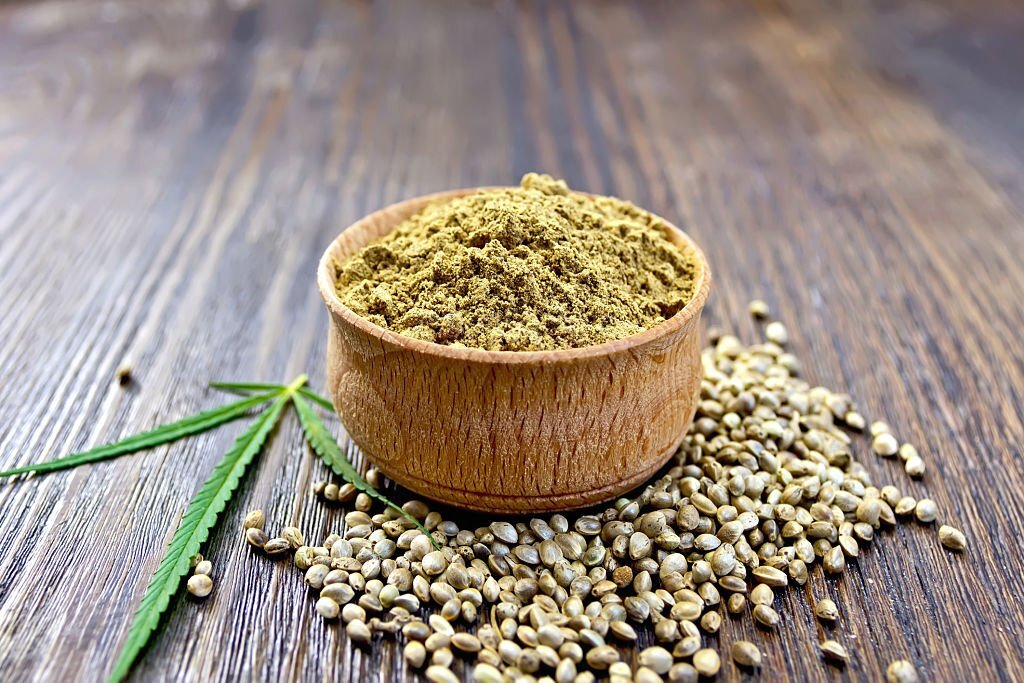
If you want your food to be gluten-free, you can use hemp flour as an alternative to psyllium husk powder, as it consists of an excellent quantity of protein and amino acids and is also perfect in cake and cookie recipes. It is also said to reduce the amount of sugar you eat as it slowly releases energy as you digest it, so your blood is always healthier.
What Is Psyllium Husk?
Psyllium husk is a soluble fiber derived from the husks of the seeds of the Plantago ovata plant. It is an edible form of dietary fiber that has numerous health benefits, including its ability to improve digestive health and reduce cholesterol levels. It can also be used as a thickening agent in baking and cooking.
Psyllium husk is a great way to get more dietary fiber into your diet. The husks are rich in mucilage, a gel-like substance that helps to bulk up the stool and improves its ability to move through the intestines. As a result, psyllium husk can help relieve constipation and promote regular bowel movements. Additionally, psyllium husk helps to reduce cholesterol levels by binding to bile acids in the intestine and promoting their excretion from the body.
Psyllium husk can be used in baking in place of other ingredients such as cornstarch or flour. It helps to create a lighter, fluffier texture in baked goods. It can also be used as an egg replacer when mixed with water to help bind ingredients together.
Psyllium husk is available in powdered or capsule form and can be found in most health food stores or online. When using psyllium husk in baking, it’s important to follow the directions carefully, as adding too much can make the batter too thick and difficult to work with. For best results, start with a small amount and add more as needed.
Why Would You Want Powdered Psyllium Husk In Your Diet?
Psyllium husk is obtained from the seeds of Plantago ovata and has long been used as a laxative due to its high fiber content and water-absorbing abilities. In the past few years, people have started using psyllium husk powder for baking to get some of these benefits, in the hope that it will help them lose weight and prevent digestive problems.
Psyllium husk powders are widely accessible on the market, but they may also be found in your local grocery shop or organic/health food store. Many dietary supplement manufacturers use it in large quantities as a filling and binding agent for their dietary supplements, such as energy bars. Psyllium husk is also commercially used in the manufacture of Metamucil supplements, which are widely available in US pharmacies.
Final Words
Powdered psyllium husk has been used for ages. When boiled, psyllium transforms into a gel-like material that can result in weight loss. You can buy psyllium husks at your local grocery store.
But there are many alternative ingredients that will give the same results and not cost as much. These best psyllium husk alternatives are fantastic since they can be used in everyday dishes such as bread, muffins, and pancakes. Therefore, you can use a substitute for psyllium husk powder when you want to save money or time by baking or cooking with psyllium husk powder.
